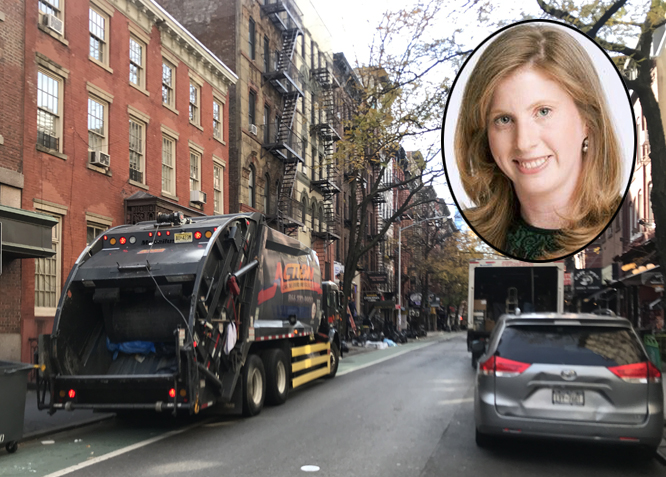Streetsblog has written several articles that quoted government sources and advocates claiming the Department of Sanitation is not fully committed to a reform of the commercial waste hauling industry that passed the City Council in 2019. On the eve of Wednesday's Council oversight hearing, we asked DSNY Commissioner Jessica Tisch to fully clarify her agency's position:
In 2019, after years of advocacy and to great fanfare, New York City enacted a sweeping reform of the commercial waste industry, the patchwork of private waste haulers who pick up refuse, recycling, and compostable material from every single one of the city’s businesses. The upgrades in safety, worker protection, emissions standards, and public reporting in this law will meaningfully improve our neighborhoods.
Most significantly, there will only be up to three permitted haulers in each neighborhood once the law is fully implemented — fewer trucks, more safety, cleaner air.
But anyone who said during or after passage of this sweeping law that putting it into place would be a fast or easy process was, simply, mistaken.
Looking at similar programs in Los Angeles and across the country, we know that commercial waste regulations face two existential threats that must be managed: massive downstream increases in cost to businesses and litigation that stalls implementation.
I can’t guarantee that those challenges won’t impact the New York City commercial waste program. What I can guarantee is that Mayor Adams and I are doing everything in our power to prevent them.
Before last year, the Department of Sanitation was not focused enough on preventing unsustainable price increases at a time when small businesses are already struggling. Since then, we have reprioritized keeping prices down without sacrificing commitments to safety and worker protection, a no-brainer given that cost hikes nearly killed commercial waste reform in Los Angeles. These kinds of programs do lead to higher costs to businesses when they are done wrong — sometimes even when they’re done right.
We have to undertake a thoughtful process to make sure that any price increase is in line with improved service, not the result of bureaucratic missteps.
To that end, we have taken the time to follow a procurement best-practice, requiring carters to submit Best and Final Offers containing their most competitive pricing to businesses. We have also engaged in a careful, painstaking, months-long review of all proposals to ensure that no bidder is disqualified due to mere paperwork issues. This is essential to keeping prices down, because more responsive bidders means more competition.
We’ve done all of this while adhering to the letter of city rules so that the end result is airtight and will stand up in court. In order to do this, we need to limit what we say publicly, so that no carter can claim their competition had an advantage. To the untrained eye, this can look like there’s nothing going on behind the scenes; I assure you, nothing could be farther from the truth.
Making a procurement like this work while precisely following all legal requirements isn’t rocket science, but it does take time. There are lots of steps, and for a single contract, each one of them – scoring the proposal, negotiating with the awardee, registering the contract — takes a matter of months, not weeks.
The procurement process for waste at our Brooklyn Marine Transfer Stations, for example, was just one contract, but following city rules properly meant it took 31 months from request for proposals to award. Again, that was one contract. Commercial waste reform includes up to 65 different contracts covering an estimated 20 million pounds of waste per day. Mayor Adams has made a commitment to cutting the red tape involved in city procurement, and we aren’t looking at many years of remaining work, but if we want to keep prices low, it does take time.
But if we don’t do it — if we don’t look at every detail and work to get this done properly — all the positive change workers and activists fought for is at risk.
This administration says commercial waste reform is worth taking the time to do right.
Jessica Tisch is the commissioner of the city Department of Sanitation.
The City Council will have an oversight hearing at City Hall on Wednesday at 10 a.m. For information, click here. Hearings are live-streamed on the Council website.






